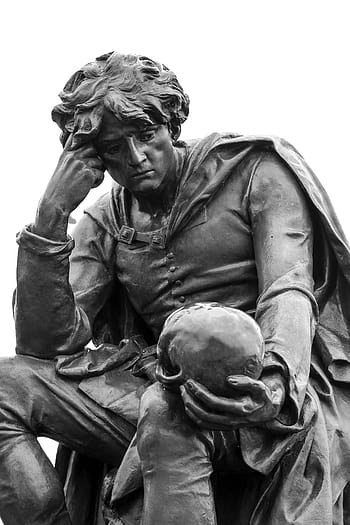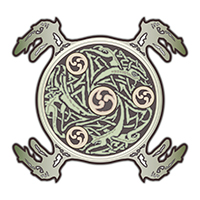I’ve always loved Shakespeare’s tragic Hamlet. It connects so well to Modern people and the familiar battles of Modern inter-family strife, divorce, step-family conflict, power, money, manipulation, and angst. But Hamlet represents so much more, I’ve always felt. And his character is very much a reflection of not just our ancient myths and heroes, but the psychology of ourselves.

Hamlet is the opposite of how many of us are told life should be in a free Democracy – that we are 100% in control of our lives. That’s just not the case at all. Hamlet reminds me of the fact we are all born in situations we often cannot control or escape – poverty, racism, family strife, political evils, cultural limitation, destroyed environments, etc.
Hamlet is “Rebel without a Cause” or any number of 20th or 21st century Modern movies or books…..the troubled teen in conflict with their parents or the pressures of society. But that just references the Greek Tragic Hero motif in which an individual, in disunion with his society and his place in it, goes on a physical and spiritual journey to confront his own monsters, save the princess, steal the fire, or find the source of spiritual wisdom. That is the ageless truth of who Hamlet really is the quintessential Tragic Hero.
But Hamlet represents our own inner psychological conflict as well. And it’s that which makes his story so enduring. The challenges to his mother’s marriage, rejection of Ophelia, the revelations given him by the ghost of his father, his soliloquy on death, and his murderous plots in the end is less about tragedy for people and more about the traps we feel ourselves in as Modern People; of the power-plays around us that powerful people have over us and the limited will or power we feel we have to not just change them but identify their true cause.
Hamlet is not free to choose his fate as he is trapped in the “great play of the world” around him. Such a corrupted world any sensitive intelligent youth today would find himself trapped in and so enact revenge against it, as many now seem to do. Hamlet saw his family’s vices as his vice as well so elected to judge it as doomed rather than change it. He saw the distorted society that bound him to it as he did his uncles murderous plots wrapped inside it, and so felt helpless in the first act but resolved to destroy it in the end.
This then reflects so well our own Modern American themes today after 50 years of Postmodern’s destruction of its value systems….. the divorce-culture of America running wild, the vapid consumerism that controls us, the disconnect from family and children, the corruption of corporate greed, the rise of racism and false blame, and the perverse power and money games we play in order to gather resources for ourselves against the needs of others. Perhaps we too feel trapped and see unconsciously it does not serve us.
Hamlet is the part of ourselves, the sensitive side, that rejects Modern society, that challenges its false paradigms, its insidious greed, its shallow consumerist Mythologies, and its cultural lies and so rises up to rebel against it spiritually. Wrapped in Postmodern values Hamlets words then become the conflict in us that desires fairness, truth, family, and justice yet has no solution but the dire resolution to move towards some bitter irrational end. This is the end result that comes with a rejection of values, from violence, from hate groups, and voting for ignorant rebellious tyrants in our political system that seek to resolve our conflicts like Hamlet with blunt resistance, failed ideology, and brute force.
Hamlet thus becomes a form of universal anti-hero determined to die for revealing the truth of his predicament. What a heroic thing that is, if you really think about it. It’s not a gloomy idea but crosses over into a sort of transcendental view of life in a Western world so used to the Christian ideal of freewill. In that sense Hamlet like all the Classical Greek heroes defies the will of the Gods- in this case his corrupt family – and breaks free of it by revealing its ugliness and corruption. Hamlet perishes in the conflict by placing mirrors before his friends and family, revealing them for what they truly are. But in doing so he reveals the truth of his own ugliness and mortality, no longer the judge but falling under the same judgement.
As such Hamlet is Human. For we are all flawed, and therefore not fit to judge anyone but ourselves.
That’s quite a meaningful story and to me taps into something metaphysical about life today. Are we willing to elect corrupt politicians, accept the limitations of failed democracies, believe the lies of trusted family members, follow the evils of good people, accept blindly lies for the sake of economic gain or failed economic theory so we can fit into such a world? Or are we brave enough like Hamlet to strike “against the grain” and seek the truth and stand for justice and what’s good in us – goodness for its own sake – for the ideal of Truth? And yet, is it truly our place to condemn or judge anyone as Hamlet has done? What comes of death and consequences we enact on others but our own tragic death?
In fact Hamlet teaches us we cannot truly change anything for the better. All we can do is change ourselves. And yet Hamlet shows us a drama about our lives that is universally tragic, more tragic than all the suffering a play can harness. For life itself traps us, if we let it. Life uses us to its own tragic end, if we let it. Freeing ourselves from our own tragedy is what Hamlet the play has done. But in doing so, we question the wisdom of returning to participation of its darker acts. Should we?
That’s why I love the enduring hero of Hamlet.
Hamlet is not psychological character development he is just a fallen hero in us trapped in a world very much like Hamlet’s world. And so his struggle and assault on the lies of it is our assault on our own internally.
But it’s a healthy resistance and a healthy approach to have such a character as Hamlet. Because we need Tragic heroes today, heroes that truly die in fiction like heroes always do, sacrificing themselves for fire or truth or defiance itself so that we can learn something about our own psychology and rise to face reality and make it and our culture a better place that serves us all spiritually as well as monetarily.
– the Author



